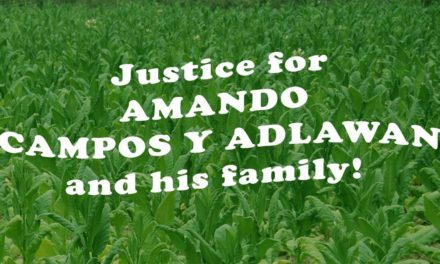MEDIA RELEASE
Save Agrarian Reform Alliance (SARA)
Secretariat: c/o Focus on the Global South, 19 Maginhawa St., UP Village, Quezon City 1100 Tel: (+63.2) 355.2758
Farmers, Activists Vow to Intensify Own AR Initiatives vs Govt Failure and Land Grabbing
Escalate the agrarian reform struggle and create a surge of ground initiatives. These are the main calls of farmers organizations and agrarian reform activities as they remember the passage into law of the Comprehensive Agrarian Reform Program (CARP) 27 years ago. They have a painful memory of how in the beginning the law had already suffered from provisions that were embedded to favor landlords. There is little to rejoice for as well when commemorating its implementation, says the umbrella group Save Agrarian Reform Alliance or SARA.
Farmers’ organizations and agrarian reform activists belonging to the group are thus launching a campaign that will push and intensify agrarian reform on the ground whether through the implementation of CARP/ER or by relying on their own initiatives to claim/reclaim the lands that should already be owned and tilled by farmer-beneficiaries.
The main hindrance to the realization of the aspirations of the Constitution on agrarian reform as means to achieve social justice and to the implementation of the law has consistently been the collusion between government and landlords and business sector, according to SARA.
Government’s neoliberal economic paradigm as seen in its relentless push for expansion of private corporate control even over public domain (lands, water, mineral and other resources) has “killed agrarian reform,” the group has declared.
According to Katarungan‘s manifesto for the 27th anniversary of CARP, this collusion has paved the way for more land grabbing.
“Land grabbing by corporations owned by the Ayalas, Sy, Villar, Gokongwei, Tan (Andrew), Tan (Lucio), among others, continues unabated. They have arrogantly ignored the Certificate of Landownership Awards (CLOAs) or land titles for thousands of hectares of lands held by thousands of farmers. One such case involves 1,760 hectares of land inHacienda Matias in Quezon province. Amounting to 600,000 hectares that are intended for farmers under CARPER remain undistributed, apart from the one million hectares that seemed to have vanished during the 20-year implementation of CARP and due to land conversions, CLOA cancellations, triumph of cases of exemptions and retentions filed by landlords.”
“We blame the government-oligarchy complicity for the killing of CARP/ER’s. Hacienda Luisita, for example, is in danger of re-consolidation back in the hands of the Cojuangcos because of the lack of integrated support services, unaddressed informal lease transactions called ‘arriendo’ system and government’s insistence that beneficiaries continue to plant sugar cane using the ASEAN Economic Integration as a pretext,” says Ka Jaime ‘Jimmy’ Tadeo, former Constitutional Commissioner and presently farmer-leader of PARAGOS-Pilipinas.
SARA leaders assert that President Benigno Aquino III holds the “worst” CARP performance of all time. It attained only a 110,619.50-hectare annual land distribution rate, far below the Ramos government’s 316,673-hectares, and Corazon Aquino’s 141,420-hectares. Similarly, while the current government’s performance remains better than the Estrada presidency’s dismal 89,163-hectares, it is still much lower than Arroyo’s 119,301-hectare annual rate.
Under Aquino, the Department of Agrarian Reform has failed in the distribution of contentious untitled private agricultural lands, which are cultivated lands and where share tenancy arrangement exists. “There remains approximately 109,350 hectares of undistributed, untitled privately claimed agricultural lands which DAR earlier struck out from the official land distribution balance— mainly from the Ilocos region, Central Luzon, Bicol and Western Visayas . What does the government plan?”, asks KaTrinidad Domingo of Pambansang Koalisyon ng Kababaihan sa Kanayunan (PKKK- National Coalition Rural Women).
Farmer-leaders of the Save Agrarian Reform Alliance have expressed disgust towards the delaying tactics and other manipulations being employed by the landlord bloc in the House of Representatives in order to prevent the passage of House bill 4296, which seeks to extend the issuance of notices of coverage, an initiatory step in the land acquisition process of lands that have already been earmarked for distribution under the law, but which the Department of Agrarian Reform again failed to do.
“Landlords from the Visayan bloc in Congress are inserting anti-farmer and anti-agrarian reform provisions which will exempt their landholdings from distribution. We do not accept the way Congress is mangling the agrarian reform program. In the hands of legislators, the law/program is becoming more defective instead of improving,” says Ka Elvira Baladad of Samahang 53 Ektarya ng Macabud, a group of farmers based in Rizal province.
SARA will continue to push for the implementation of CARP’s other provisions, as only the land acquisition and distribution (LAD) phase has expired in June 2014, particularly the State’s obligation to extend support services, including equal access to credit and support by rural women. However, as in the past, the group claims that it will no longer just rely on the law, filled with loopholes by the landlord-dominated Congress when it was passed in 1988 and weakened by the lack of political will of government to implement fully and effectively.
“Whenever, land struggles or agrarian reform become relatively successful, these happened because of the concerted efforts of movements from below; through our rightful resistance and meta or extra legal strategies such as land occupations, self-installations to claim our farmer’s rights. We have also received the support of champions or allies, especially from sectors like the Catholic Church, youth, women, urban-based groups, and labor,” says Eduardo Mora of Pambansang Kaisahan ng mga Magsasaka sa Pilipinas.
SARA enjoins other sectors and social movements to also push for agrarian reform as it is not only a farmers’ issue, but is closely linked to the future of the country’s food security. Defending the land and the future of our food producers are critical components of the future, especially of a broad-based rural development that will truly benefit the Filipino people, avers SARA.
In what it calls a new phase of struggle, the group says the endgame of agrarian reform should be the dismantling of the monopoly on land of landlords and corporations, which will happen under a development paradigm that is just and democratic, not neoliberal. It also vows to reclaim the CARPable lands that have been lost to conversions, reversals, cancellations, and land grabbing.
Contact Person:
Mary Ann Manahan, +639063983206, (+63.2) 355.2758






![[IN PHOTOS] In Defense of Human Rights and Dignity Movement (iDEFEND) Mobilization on the fourth State of the Nation Address (SONA) of Ferdinand Marcos, Jr.](https://focusweb.org/wp-content/uploads/2025/07/1-150x150.jpg)

